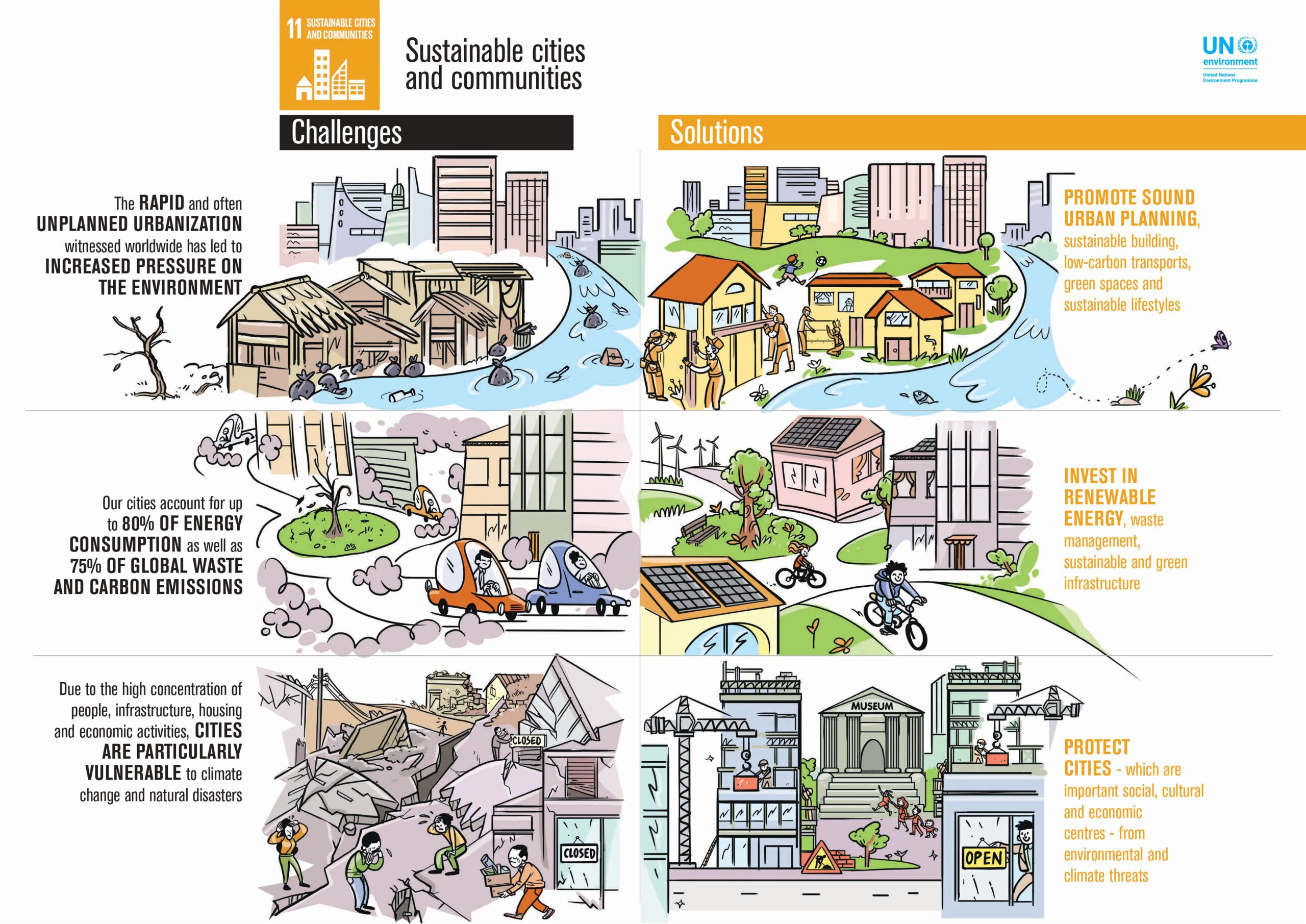Nouvelle
Cities and the Environment

Mise à jour: 28 Nov 2023
Over the last decades, cities have emerged as the world’s economic platforms for production, innovation and trade, providing opportunities for poverty alleviation and improvement of quality of life. However, urbanization is also a driving force of environmental degradation and its associated impacts on human health and livelihoods. Thus, the role of cities is critical to tackle the triple planetary crisis of climate change, biodiversity loss and pollution. This page provides an overview of these challenges and the initiatives led by actors in Geneva and beyond to address them, in particular in the context of World Habitat Day and World Cities Day.
Why Cities Matter
Today, more than half of the world’s population lives in urban areas and this proportion is expected to increase to 68% by 2050 (UN, 2018). Cities are also powerhouses of economic growth, contributing about 80% of global GDP (World Bank, 2020). As the world continues to urbanize, cities have become key players in the pursuit of the Sustainable Development Goals (SDGs). Responding to the needs of urban populations comes with many challenges, whether related to housing, transportation, energy systems, infrastructure, employment or basic services. As cities do not exist in a vacuum, addressing these challenges cannot be complete without considering the multiple links between cities and the environment.
On the one hand, the environment directly impacts cities and their populations. Around one-third of the world’s population lives in cities at risk of cyclones, floods, droughts, earthquakes, landslides or volcanic eruptions (UN DESA, 2018) Climate change further exacerbate these risks with more frequent and intense floods, droughts, sea level rise, heatwaves, landslides and storms (WMO, 2021).
On the other hand, cities are a major driver of environmental change. Urban sprawl transforms landscapes, thereby affecting ecosystems and biodiversity. Cities are also a major contributor to climate change, as they are responsible for around 75% of global greenhouse gas emissions (UNEP). Urban areas also generate considerable amounts of waste, much of which remains poorly managed and becomes hazardous to people’s and ecosystems’ health. Air pollution, which is responsible for 9% of deaths worldwide and many health issues (Ritchie & Roser, 2017), is also a particularly accute problem in cities, due to transportion and production patterns.
These deep interlinkages between the urban and the environment highlight just how dependant cities are on the environment. Indeed, the environment provides numerous ecosystem services, which are essential for food production, clean water, flood and climate regulation, and more (UNEP). Thus, building more sustainable, climate-resilient cities that work in harmony with nature is essential to secure people’s well-being and livelihoods and achieve the SDGs.
SDG 11 – Sustainable Cities and Communities
In the 2030 Agenda for Sustainable Development, countries have committed to engage in systematic follow-up and review of progress towards the Goals and targets, using a set of global indicators. SDG 11 formulates the ambition to make cities and human settlements inclusive, safe, resilient and sustainable.
While cities occupy just 3% of the Earth’s land, they are a driving force of social, economic, and environmental change. Rapid urbanization is resulting in a growing number of slum dwellers, inadequate and overburdened infrastructure and services (such as waste collection and water and sanitation systems, roads and transport), worsening air pollution, and unplanned urban sprawl. Thus, the environment is intrinsic to SDG 11, which puts forward the need for critical urban infrastructure to be low-emission, resource efficient and resilient. Better urban planning and decision-making with strives to decouple, decarbonize and detoxify our cities are crucial strategies to achieve SDG 11.
Urban October

Every year UN-Habitat and partners organize a month of activities, events, and discussions around urban sustainability in October. Urban October is an opportunity to foster dialogue at the global and local level about the challenges and opportunities created by the fast rate of change in our cities and towns. The month begins with World Habitat Day on the first Monday of the month and ends with World Cities Day on 31 October. In 2023, the focus will be on SDG 11, “Make cities inclusive, safe, resilient and sustainable”, recognizing cities as centres for economic growth and development that also face demographic, environmental, economic, and social challenges.
World Habitat Day
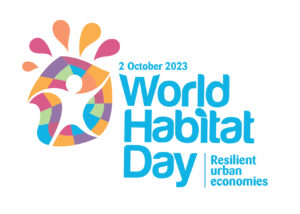
Urban October opens with World Habitat Day on the first Monday of October to remind the world that we all have the power and the responsibility to shape the future of our cities and towns. On 2 October 2023, the Global Observance of World Habitat Day, under the theme Resilient urban economies. Cities as drivers of growth and recovery, will look at how cities can position their economies to benefit residents. The official celebration of the event will take place in Baku, the Republic of Azerbaijan with a high-level segment, exhibitions and various panels in program.
World Cities Day
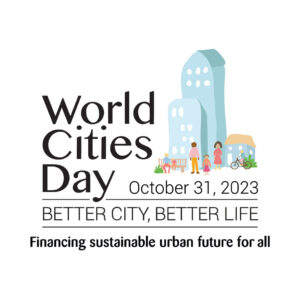 Closing Urban October on 31 October, World Cities Day aims to promote the international community’s interest in global urbanization, push forward cooperation among countries in meeting opportunities and addressing challenges of urbanization, and contributing to sustainable urban development around the world. The 2023 edition will be celebrated under the theme Financing sustainable urban future for all, and will explore how we can unlock transformative investment in urban planning and achieve adequate fiscal decentralization. The Global Observation will take place in the Municipality of Üsküdar in Istanbul, Türkiye.
Closing Urban October on 31 October, World Cities Day aims to promote the international community’s interest in global urbanization, push forward cooperation among countries in meeting opportunities and addressing challenges of urbanization, and contributing to sustainable urban development around the world. The 2023 edition will be celebrated under the theme Financing sustainable urban future for all, and will explore how we can unlock transformative investment in urban planning and achieve adequate fiscal decentralization. The Global Observation will take place in the Municipality of Üsküdar in Istanbul, Türkiye.
Events in Geneva
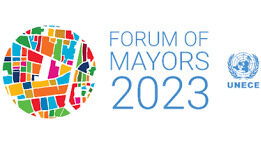
3rd Forum of Mayors (2023)
UNECE | 2-3 October 2023
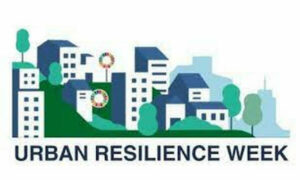
Urban Resilience Week
UNECE | 2-6 October 2023
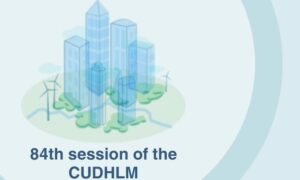
84th session of the UNECE Committee on Urban Development, Housing and Land Management
UNECE | 4 – 6 October 2023

Forum Mobilité 4e édition | Villes mobiles
Le Temps and tpg | 4 October 2023 | 16:30 -20:0 CEST

ITU Webinar | World cities day: digital transformation for a better urban life
ITU | 31 October 2023 | 14:00 – 15:00 CET
Cities and Climate Change
Cities are responsible for around 75% of global greenhouse gas (GHG) emissions, with transport, buildings, energy, and waste management being among the largest contributors. Thus, cities have a critical role to play in the fight against climate change and the global effort to meet the objective of the Paris Agreement. Creating sustainable, carbon-neutral, inclusive cities and towns.
Meanwhile, cities worldwide are increasingly suffering the effects of climate-related disasters, such as floods, droughts, sea level rise, heatwaves, landslides and storms. At least 130 port cities with over one million inhabitants are expected to be affected by coastal flooding and the one billion people in urban informal settlements are particularly at risk.
Cities are on the front line of climate change impact and must be at the heart of climate action. Many cities and communities around the globe are already taking action to build climate resilience and identify successful pathways to reduce GHG emissions. Global initiatives – such UN-Habitat’s Cities and Climate Change Initiative (CCCI), the Cities Climate Finance Leadership Alliance, the Global Covenant of Mayors for Climate & Energy or the C40 Cities network – are fostering collaboration between cities and promoting innovative solutions to mitigate and adapt to climate change in urban areas.
Discover more on the nexus of cities and climate change through the resources below:
- Climate Change | UN-Habitat
- Seven Ways Cities Can Take Climate Action | UNFCCC | 9 April 2021
- Urban Climate Action Is Crucial to Bend the Emissions Curve | UNFCCC | 5 October 2020
- Why Cities are the Solution to Global Climate Change | C40 | 2012
Cities and Biodiversity
Although it may not be so glamorous as wild seashores, plains, and mountains, urban biodiversity plays an essential role to support life in cities and beyond. Nature within cities provides multiple benefits, including clean air, water filtration, flood prevention, climate mitigation and adaptation, as well as physical and mental health benefits.
However, current urban development patterns often undermine biodiversity and reinforce the disconnect between humans and nature. Cities are a large contributor to land-use change, climate change, nitrogen deposition and the introduction of invasive species, which then drive biodiversity loss. Urbanization is identified as the third biggest threat to species on the IUCN Red List. Besides the direct impact on urban flora and fauna, the ecological footprint of cities expands way beyond to the distant ecosystems which support the drive on urban development.
Thus, investing in ecosystem conservation in urban areas is essential if we are to address the biodiversity crisis. Mainstreaming nature considerations in urban development is also critical for a transition to a more healthy and sustainable future. Furthermore, investing in nature makes economic sense, as nature provides cost-efficient solutions to many challenges including air pollution, flood prevention, and climate change adaptation.
Further explore the interlinkages between nature and cities through the resources below:
- Support for new cities plan for biodiversity for the next decade | 17 March 2022
- Cities and Nature: the Issues | IUCN Urban Alliance
- Cities should respond to the biodiversity extinction crisis | Oke et al. | Urban Sustainability | 23 February 2021
- Cities and Biodiversity Outlook – Action and policy | Convention on Biological Diversity | 2012
- Cities, Biodiversity and Governance | Suwa et al., United Nations University | 19 March 2011
- Nature Within Cities and Cities Within Nature | UNEP | 30 June 2021
Cities and Pollution
As cities concentrate populations and high levels of human activities, they often face dramatic problems of pollution and related health risks. Responsible for 1 in 9 deaths worldwide, air pollution is a particularly pressing problem in cities, where dense transportation and industrial activities are releasing many pollutants. Currently, 9 in 10 people living in urban areas worldwide are breathing air that does not meet the WHO’s air quality guidelines. The provision of safe and clean water also represents a challenge for many cities around the world, in particular in informal settlements.
Cities are also faced with the challenging task of managing waste streams resulting from dense human activities. Where cities lack resources, infrastructure, and technical knowledge to ensure environmentally sound management of waste, negative impacts on people and the environment are concerning and often disproportionately affect the most vulnerable.
Therefore, cities are key players which can help drive action toward a pollution-free planet. Many cities around the world are now taking action to mitigate air and water pollution, reduce plastic pollution, and build robust waste management systems. Discover more about these challenges and how they can be addressed at the local and global levels through the resources below.
- Air pollution | UNEP
- Air pollution in cities: Urban Health Initiative | WHO
- Waste Wise Cities | UN-Habitat
- Plastic Smart Cities | WWF
- UN-Habitat partners with WWF to tackle global challenge of waste management in cities and plastic pollution | UN-Habitat | 10 February 2020
- The World’s Most Wasteful Megacities Are A Growing Problem | Global Citizen | 28 October 2016
Role of Geneva
Organizations are listed in alphabetical order
International Geneva
Global Cities Hub
The Global Cities Hub (GCH) (formerly Geneva Cities Hub) is a platform that facilitates interactions between local governments and Geneva-based international actors. Created by the City of Geneva and the Canton of Geneva, with the support of the Swiss Confederation, the GCH is an organization focused on urban actors and concerns. It assists cities and city networks to contribute more effectively to multilateral processes and bodies, while also providing a neutral platform to discuss urban issues and improve the visibility of the urban work of Geneva-based entities. The GCH also complied an international city networks directory to enhances the visibility of urban networks, partnerships and initiatives in International Geneva’s ecosystem.
International Telecommunication Union
The International Telecommunication Union (ITU) is the UN specialized agency for information and communication technologies (ICTs). With regards to the urban, ITU is working to improve the reliability, security and interoperability of ICT infrastructure needed for smart sustainable cities, while at the same time advocating for the use of ICTs to reduce the consumption of energy and enhance services and quality of life for city dwellers. This includes work on setting standards and fostering global collaboration and advocacy. In collaboration with UNECE, UN-Habitat, and with the support of 14 other UN agencies and programmes, ITU is coordinating the “United for Smart Sustainable Cities” (U4SSC) initiative.
International Union for Conservation of Nature
The International Union for Conservation of Nature (IUCN) is a global authority on the status of the natural world and the measures needed to safeguard it. Since January 2012, IUCN is a member of the research project URBES (Urban Biodiversity and Ecosystem Services) which aims to inform urban management and decision-makers on how to best integrate the natural environment and human needs. The IUCN Urban Alliance – a coalition of IUCN constituents – harnesses IUCN’s knowledge, experience and influence to promote socially inclusive, economically responsible and environmentally sustainable cities.
United Nations Economic Commission for Europe
The United Nations Economic Commission for Europe (UNECE) is working jointly with ITU to develop a definition of and a global standard for smart sustainable cities. The UNECE approach takes a city through a full cycle from city evaluation as Sustainable and Smart, to recommendations on how to move it forward in this area, to supporting the innovative financing and investments to concrete city projects. UNECE is also one of the core coordinators of the U4SSC initiative.
In addition, the UNECE Housing and Land Management Unit provides the secretariat to the UNECE Committee on Urban Development, Housing and Land Management, Working Party and Advisory Group. It works to promote energy efficient and adequate housing, including for those with special needs and vulnerable population groups; compact, inclusive, resilient, smart and sustainable cities; and, transparent and efficient land use, and property registration. Established in 1947, the Committee is also the only intergovernmental body addressing the housing and urban development challenges of the UNECE region and is the highest policymaking body of UNECE in housing, urban development and land management.
UN-Habitat Geneva Office
UN-Habitat works with partners to build inclusive, safe, resilient and sustainable cities and communities. While UN-Habitat’s headquarters are in Nairobi, Kenya, the Geneva Liaison Office manages and leads UN-Habitat’s policy dialogue, partnerships and collaborative programmes with the large number of humanitarian and development agencies and NGOs located in the international hub city of Geneva. The Geneva Office also serves as a major focal point for inter-agency dialogue on sustainable urbanization among Geneva-based organizations engaged in global challenges of poverty eradication, social inclusion, climate change, energy security and conflict mitigation.
United Nations Population Fund Geneva Office
The United Nations Population Fund (UNFPA) works with partners to promote inclusive urbanization, including by improving access to health care and opportunities in urban slums. UNFPA also advocates for the welfare and sustainability of urbanizing communities, and helps gather data about their needs. While headquarters are located in New York, UNFPA is also active in Geneva through its liaison office.
World Business Council for Sustainable Development
WBCSD is a global, CEO-led organization of over 200 businesses working together to accelerate the transition to a sustainable world. Through its Cities program, WBCSD offers a space for interactions between cities, businesses and citizens to engage with each other, build a common vision and develop suitable innovative solutions. In the area of urban mobility, WBCSD also develops tools, guidance, and policy recommendations to transform the transport sector.
World Economic Forum
The World Economic Forum (WEF) is leading the BiodiverCities by 2030 with the Government of Colombia. This global initiative supports city governments, businesses and citizens around the world to create an urban development model that is in harmony with nature.
World Health Organization
The World Health Organization (WHO) engages with issues at the urban and environment nexus, recognizing that urbanization is one of the leading global trends of the 21st century that has a significant impact on health. Thus, WHO is developing guidelines to address these challenges, including air pollution, poor sanitation and waste management, water and soil contamination, urban heat islands, and a dearth of space for walking, cycling and active living. WHO is working with cities to encourage them to harness opportunities for better health, cleaner environment and climate action.
Local Geneva
City of Geneva
The City of Geneva is committed to sustainability. Thus, local authorities are taking steps to reduce the environmental and social impact of our activities and fight inequalities while developing a sustainable and innovative local economy. The Agenda 21 Department coordinates the municipal strategy in collaboration with all the municipal departments concerned. The city is also promoting the return of nature in the city, with parks and gardens accounting for almost 20% of the municipal territory.
State of Geneva
The State of Geneva promotes a balanced and sustainable development for Geneva and its region, which protects the planet and the well-being of future generations. As Geneva is a highly urbanized area, the State’s actions for the environment and sustainability – such as the biodiversity or climate strategies – are linked with urban challenges. For that purpose, the State collaborates with municipal authorities within its territory and across the border for a shared vision of the “Grand Genève”. The State also coordinates the Smart Geneva initiative which promotes innovation for sustainable urban transformation.
News
- Mayors are at the forefront of urban health leadership | Global Cities Hub Geneva | 28 November 2023
Mayors and urban leaders play a pivotal role in addressing a wide range of health challenges within their cities, encompassing noncommunicable diseases, infectious diseases, injuries and violence, health inequity, and health security and emergency preparedness. Mayors are at the forefront of urban health leadership, and their actions can significantly impact the health and well-being of their citizens. Mayors and other local political and community leaders also play a crucial role in preventing, preparing for, responding to, and recovering from health emergencies. - Historic decision to institutionalize the Forum of Mayors | Geneva Cities Hub | 13 January 2023
UNECE Member States officially established the Forum of Mayors as a UN body and decided that it would be convened annually in Geneva immediately prior to the session of CUDHLM. At a time when multilateralism is sometimes called into question, it is important for the UN to remain a space for open dialogue. Geneva, as the cradle of international cooperation, is the most adequate place to host the Forum of Mayors.
Learning
Learn more about the cities and environment nexus through the courses below:
- Cities and Climate Change | UN CC:Learn
- Taking Sustainable Urban Mobility to the Next Level | Online Course | UN-Habitat
- Introductory Course on the International Legal Framework on Transboundary Air Pollution | InforMEA
- CAS Nature en ville (in French) | HEPIA
- Urban Nature: Connecting Cities, Nature and Innovation | Lund University & Naturvation
Past GEN Events
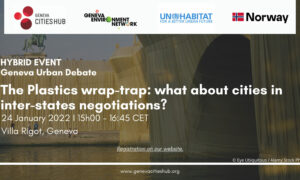
The Plastics Wrap-Trap: What about cities in inter-states negotiations?
Geneva Cities Hub, Geneva Environment Network, UN-Habitat | 24 January 2022

Cities & COP26 Negotiations | City Diplomacy Series
Geneva Cities Hub, co-sponsored by the Geneva Environment Network | 16 December 2021

Nature-based Solutions and Cities
Geneva Nature-based Solutions Dialogues | International Union for Conservation of Nature, Geneva Environment Network | 25 October 2021
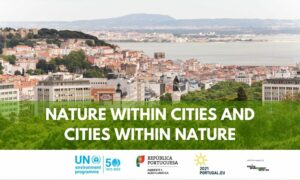
Nature Within Cities and Cities Within Nature
United Nations Environment Programme and Portuguese Presidency of the Council of the European Union, with support of the Geneva Environment Network | 30 June 2021

